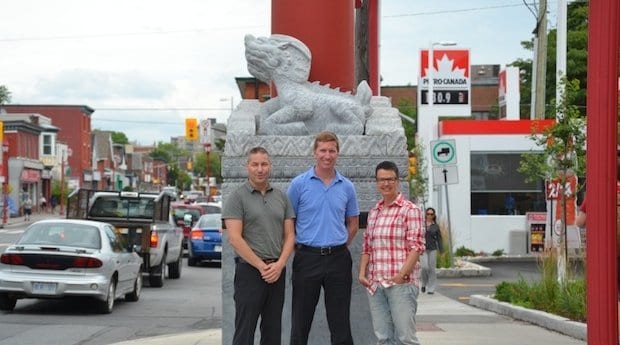With the Ottawa municipal election getting closer every day, the LGBT residents of Somerset West (Ward 14) will soon be faced with an interesting choice. Of the seven candidates running for the ward’s city council spot, two are gay men and one is a queer woman. Not only that, all three have been heavily involved in the city’s LGBT community.
Jeff Morrison is the former president of the board at the Centretown Community Health Centre, which runs the successful Gay Zone Gaie program. He’s a longtime advocate for the gay community and was a key force in the opposition to a downtown Ottawa casino.
Denis Schryburt is a past president of PTS, a former community co-chair of the Ottawa Police Service’s LGBT liaison committee, and a past vice-president of the Centretown Citizens Community Association. He is also on the advisory council of the Eldercare Foundation.
Catherine McKenney is the direct strategic support and advisor to the Deputy City Manager, was longtime assistant to Councillor Diane Holmes and worked on the mayoral campaign of Alex Munter. On the Hill, she has been a legislative assistant to both Ed Broadbent and Paul Dewar, and with her wife, she’s the mother of a seven-year-old daughter.
Xtra sat down with the candidates on July 30 to get their take on some of the key issues facing Somerset Ward and the downtown LGBT community. Here are some of their responses.
Xtra: Seniors are a growing demographic in the city, particularly downtown. How do you think the city should respond to the needs of this population, particularly the needs of LGBT seniors?
Catherine McKenney: Those folks who came out, that sort of first branch in the 1970s and ’80s, they’re becoming seniors now . . . They’re activists, they were out, they were proud . . . and they’re not going back in the closet. So it’s important that we look at how we service seniors and make sure that our agencies that service seniors are culturally competent, if you will.
I know that the [Ottawa] Senior Pride Network has done a lot of work with the Good Companions Centre, to much success . . . I think that the next frontier really there is looking at retirement and long-term care homes. And you know, long-term care homes fall under the privy of the city.
We’ve done some work with Carleton Lodge where we’ve gone in and worked with the staff, but more important worked with residents, because you’ve got residents who are seniors who perhaps didn’t grow up in an urban centre and maybe don’t want to share their space, don’t feel they should have to share their space with a queer roommate, and they do . . . Nobody should be forced to go back in the closet as they age. I think that’s why the training and going in and the work that the Senior Pride Network is doing around that is hugely important
Jeff Morrison: About two and a half years ago . . . I met with the Good Companions’ executive director and chair to talk about the GLBT programming for Good Companions, and the reason we met is because they had wanted to get into this area, but there was a lot of hesitation among some of the non-gay members of Good Companions.
I think the education component, the awareness-raising component of the challenges facing GLBT seniors, and I think also just the basic access to healthcare is a priority for seniors, GLBT or otherwise, for obvious reasons . . . I think those services that seniors will require to age gracefully at home in the ward are going to be priorities.
Denis Schryburt: I’m on the advisory council for the Eldercare Foundation [of Ottawa], and we raise money for not-for-profit long-term care homes. We go into those long-term care homes all the time, and one of the questions I brought to the table . . . is about queer seniors; is there a space for them?
Many of them say it’s very difficult to be a queer couple, let alone queer seniors, in today’s homes because the people that they’re retiring with are the same people who had the issues in the past. So their minds have not changed from the 1930s and ’40s to today; they still think the same way. If you were a fag back then, you’re a fag today, and you’re against God and whatever.
It’s very difficult to change those minds [when people are] in their 80s and 90s, so definitely a huge challenge. I do support aging at home; not to escape that, but in general . . . We need to make sure that it’s more affordable for [LGBT seniors], it’s better for them, it’s easier for their families, all that kind of stuff.
What are your thoughts on harm reduction in the city?
JM: With respect to safe injection sites [SIS], the evidence is clear and overwhelming . . . that they work. They work to reduce the incidence of disease; they work to put people who are drug users in contact with the healthcare system when they wouldn’t have a chance otherwise. So it’s for those compelling reasons, reducing HIV and hepatitis C in particular, that when I was president of the Centretown CHC we worked with Somerset West and with Sandy Hill CHC to look at the feasibility of opening up an SIS in Ottawa.
It’s difficult to do — the barriers are pretty high, particularly because in order to do that you need an exemption from the federal government against current drug laws. And the federal government, in the wake of the Supreme Court ruling two years ago, has put in place legislation that sets the bar so high to get an SIS that it’s nearly impossible. But having said that, I continue to support the concept. If barriers could be removed, then I would want to see it.
DS: As soon as I heard that they were thinking of Toronto and Ottawa for safe injection sites, the next available time I was in Vancouver I asked some friends of mine to set up a meeting so I could get a tour of Insite [Vancouver’s safe injection site] . . . They took me through as if I was one of the clients from beginning to end . . . Great organization.
I’m not convinced that that’s what we need in Ottawa . . . The city does have some harm-reduction programs in place citywide and through the province as well, which is great. I think we can use more, for sure, but we definitely need to work as a city in partnership with the private sector and other government to put in more treatment centres.
One of my closest friends is addicted to one of the worst drugs ever, and it’s been hell. That person has not been able to get into some treatment centres, and you know, when you make that decision, “I want to get off drugs,” and then [the health system says], “Okay, we can probably get you a place in six weeks,” well, they have time to relapse a million times in that six weeks. When people say they want to go into recovery, they should be able to.
CM: My concern today is stopping the spread of HIV. We need to stop the spread of HIV; it’s an important issue — it’s actually an issue that I’ve been working on and involved in since the late 1990s. I worked for Alex Munter when he was the chair of the health, recreation and social services committee. We convened a meeting back in 1999 where we pulled together members of the queer community, public health, we came together . . . and what came out of that was the Wellness Project, where we were able to look at the needs of the LGBTQ community across the city.
Out of this came a lot of great initiatives around reducing HIV in Ottawa. We can do more — we have to do more. We have to look at Gay Zone. There’s a need for expansion; I would support that need for expansion for Gay Zone. There’s a need in our community for more harm reduction. So today, I would be an advocate for expanding our harm-reduction programs in the city of Ottawa.
At the all-candidates debate on June 16, one topic that came up again and again was the idea of complete streets. Tell me what complete streets mean to you and why they are important for Ottawa.
CM: I think that “complete streets” means something different wherever you are as a city. It’s something very different in Kanata . . . than it is for Somerset Ward. So if we’re talking specifically Somerset Ward, it is about having a level of service that’s equal for all users of the street: for cyclists, for transit users and for cars. So taking some of the level of service away from cars and giving it to other users.
It’s great that we now have a policy within our transportation plan at the city . . . but it’s just a policy right now. There’s no money attached to it, and you only look at making a street complete through a complete renewal. I think that I would like to see $1 million a year go into the transportation budget so that anytime we do anything with the road, whether it’s modify an intersection [or] do any sort of resurfacing, we can do a bit. We can start moving towards a complete street. I don’t think it has to be all or nothing.
JM: How I see it defined is it’s a concept, it’s a planning concept that seeks to strike a balance between users of the road. So it includes pedestrians, it includes cyclists, it does include motorists. It includes mass transit users and so forth. What I said at the [June 16] debate is that I would like to see it embedded as essentially a reverse-onus principle, ie, anytime that there’s a new street development, planning staff have to accept a complete street philosophy in redesigning it unless they can prove, for whatever reason, that that multiple-user concept cannot be implemented. And again, that depends on the particular case of the street.
DS: One thing I do want to add . . . is that [for] those who are using mobility devices, as well, it is very important . . . I agree with Catherine and Jeff that it’s different everywhere, even within the ward. What you would do with complete streets on O’Connor may be different than Rochester or Cambridge or [wherever else]. But it’s just to give everybody who walks, rides, drives the best experience they can, and safe and so on, so that it’s pleasant to walk.
Click to read part two and three of Xtra’s interview with the candidates.
Watch dailyxtra.com for more from these candidates.
The Ottawa municipal election takes place Mon, Oct 27
For more information, visit
ottawa.ca
jeff2014.ca
catherinemckenney.ca
denisschryburt.ca


 Why you can trust Xtra
Why you can trust Xtra


